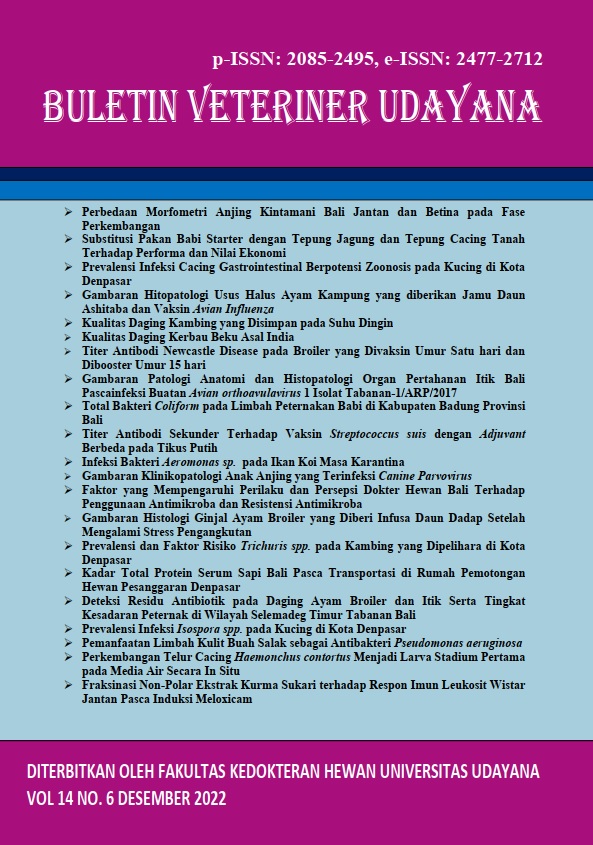INFECTION OF BACTERIAL AEROMONAS SP. ON KOI FISH DURING QUARANTINE PERIOD
Abstract
Bacteria Aeromonas sp. is one type of pathogenic bacteria in humans and can cause disease in animals. These bacteria also attack various species of freshwater fish, one of which is the koi fish. The purpose of this study was to obtain preliminary data on the infection ofbacteria Aeromonas sp. in koi fish (Cyprinus carpio L), which has the potential to cause disease in koi fish in Bali, especially koi fish that have just been imported from outside the island of Bali during the quarantine period. A total of 19 koi fish measuring 15-25 cm are suspected of being infected with bacterial diseases and dead koi fish swab was done on the scales and gills, then the sample was isolated and identified bacteria at the Balai Besar Veteriner. Water temperature and pH are measured to determine water quality. The data obtained are presented descriptively. The results showed that one sample (5.26%) was infected with Aeromonas sp.
Downloads
References
Camus AC, Durborow RM, Hemstreet WG, Thune RL, Hawke JP. 1998. Aeromonas bacterial infections-motile aeromonad septicemia (Vol.478). Southern Regional Aquaculture Center.
Cowan N, Hardman K, Saults JS, Blume CL, Clark KM, Sunday MA. 2016. Detection of the number of change s in a display in working memory. J. Exp. Psyc. 42: 169-185.
Dooley JS, Lallier R, Shaw DH, Trust TJ. 1985. Electrophoretic and immunochemical analyses of the lipopolysaccharides from various strains of Aeromonas hydrophila. J. Bacteriol. 164(1): 263-269.
Giyarti D. 2000. Efektivitas ekstrak daun jambu biji (Psidium guajava L.) sambiloto (Andrographis paniculata (Burm. f.) Nees) dan sirih (Piper betle L.) terhadap infeksi bakteri Aeromonas hydrophila pada ikan patin (Pangasius hypophthalmus). Program Studi Budidaya Perairan, Fakultas Perikanan dan Ilmu Kelautan, IPB. Bogor.
Holt JG, NR Krieg, PHA Sneath, JT Staley, ST Williams. 1994. Bergey’s Manual of Determinative Bacteriology. 9th ed. William & Wilkins. Departement of Microbiology, Gltner Hall, Michigan State University, East lansing, MI, USA, 48824-1101.
Irianto A. 2005. Patologi Ikan Teleostei. Gajah Mada University Press. Yogyakarta.
Laili U. 2007. Pengaruh pemberian ekstrak temulawak (Curcuma xanthorrhiza Roxb) terhadap prevalensi dan kelulushidupan ikan mas (Cyprinus carpio) yang diinfeksi bakteri Aeromonas hydrophyla. Fakultas Sains dan Teknologi, Jurusan Biologi, Universitas Negeri Malang. Malang.
Lesmana DS. 2001. Kualitas air untuk ikan hias air tawar. Penebar Swadaya. Jakarta, 88.
Lubis YPP, Djayus Y, Leidonald R. 2014. Jenis-jenis bakteri pada luka ikan patin (Pangasius djambal). Aquacostamarine. 2(1): 66-77.
Mahasri G, Suprapto H, Ulfiana R. 2012. Tingkat kejadian aeromonasis pada ikan koi (Cyprinus carpio carpio) yang terinfeksi myxobolus koi pada derajat infeksi yang berbeda. J. Ilmiah Perikanan dan Kelautan. 4(2): 169-174.
Mahida UN. 1984. Pencemaran Air dan Pemanfaatan Limbah Industri. Jakarta: CV. Rajawali.
Mulia DS, Pratiwi R. 2003. Pengaruh vaksin debris sel Aeromonas hydrophila dengan kombinasi cara vaksinasi dan booster terhadap respons imun dan tingkat perlindungan relatif pada lele dumbo (Clarias gariepinus Burchell). Doctoral Dissertation, Universitas Gadjah Mada. Yogyakarta.
Oregon State University. 2011. Microbiology Science. www.microbiology. science.oregonstate.edu/salmonbacteria.
Saragih AA, Syawal H, Lukistyowati I. 2015. Identifikasi bakteri patogen pada ikan selais (Ompok hypoptalmus) yang tertangkap di sungai Kampar Desa Teratak Buluh Provinsi Riau. J. Online Mahasiswa (JOM) Bidang Perikanan dan Ilmu Kelautan. 2(2), 1-13.
Sarono A, Nitimulyo KH, Leluno IYB, Widodo, Thaib N, Haryani EBS, Haryanto S, Triyanto, Ustadi, Kusumahati AN, Novianti, Setianingsih SW. 1993. Hama dan penyakit ikan karantina golongan bakteri. Kerjasama Pusat Karantina Pertanian dan Fakultas Pertanian Jurusan Perikanan UGM. Yogyakarta.
Yanuhar U, Musa M, Wuragil DK. 2019. Pelatihan dan pendampingan manajemen kualitas air dan kesehatan pada budidaya ikan koi (Cyprinus carpio). J. Karinov. 2(1), 69-74.





